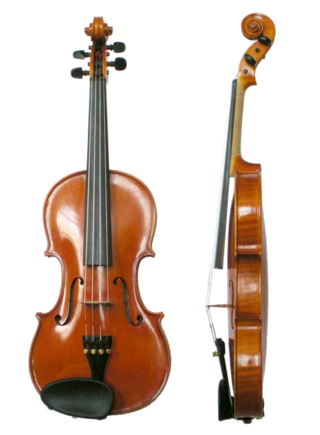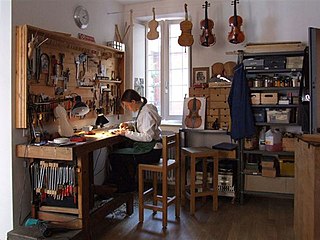
The violoncello ( VY-ə-lən-CHEL-oh, Italian pronunciation:[vjolonˈtʃɛllo]), normally simply abbreviated as cello ( CHEL-oh), is a middle pitched bowed (sometimes plucked and occasionally hit) string instrument of the violin family. Its four strings are usually tuned in perfect fifths: from low to high, C2, G2, D3 and A3. The viola's four strings are each an octave higher. Music for the cello is generally written in the bass clef, tenor clef, alto clef and treble clef used for higher-range passages.

The double bass, also known as the upright bass, the acoustic bass, the bull fiddle, or simply the bass, is the largest and lowest-pitched chordophone in the modern symphony orchestra. It has four or five strings, and its construction is in between that of the gamba and the violin family.

Isaac Stern was an American violinist.

The violin, sometimes referred as a fiddle, is a wooden chordophone, and is the smallest, and thus highest-pitched instrument (soprano) in regular use in the violin family. Smaller violin-type instruments exist, including the violino piccolo and the pochette, but these are virtually unused. Most violins have a hollow wooden body, and commonly have four strings, usually tuned in perfect fifths with notes G3, D4, A4, E5, and are most commonly played by drawing a bow across the strings. The violin can also be played by plucking the strings with the fingers (pizzicato) and, in specialized cases, by striking the strings with the wooden side of the bow.

A luthier is a craftsperson who builds or repairs string instruments.

Steven John Isserlis is a British cellist. An acclaimed soloist, chamber musician, educator, writer and broadcaster, he is widely regarded as one of the leading musicians of his generation. He is also noted for his diverse repertoire and distinctive sound which is deployed with his use of gut strings.

Giovanni Battista Guadagnini was an Italian luthier, regarded as one of the finest craftsmen of string instruments in history. He is widely considered the third greatest maker after Antonio Stradivari and Giuseppe Guarneri "del Gesù". The Guadagnini family was known for their violins, guitars and mandolins.

The violin octet is a family of stringed instruments developed in the 20th century primarily under the direction of the American luthier Carleen Hutchins. Each instrument is based directly on the traditional violin and shares its acoustical properties, with the goal of a richer and more homogeneous sound. Unlike the standard modern stringed instruments, the main resonance of the body of the violin octet instrument is at a pitch near the two middle open strings, giving the instruments a more balanced, clearer sound.

Robert Nathaniel Mann was a violinist, composer, conductor, and founding member of the Juilliard String Quartet, as well as a faculty member at the Manhattan School of Music. Mann, the first violinist at Juilliard, served on the school's string quartet for over fifty years until his retirement in 1997.
Lera Auerbach is a Soviet-born Austrian-American classical composer, conductor and concert pianist.

Christian Tetzlaff is a German violinist who has performed internationally, with a focus on chamber music.
W. E. Hill & Sons is a British firm based in London that specialises in violins and other string instruments, and bows. It was also known as William Ebsworth Hill & Sons or William E. Hill & Sons.
Avner Dorman is an Israeli-born composer, educator and conductor.

Keith M. Peck (1953–1998) was a highly acclaimed American bow maker from Evanston, Illinois. His bows are used on instruments such as those created by master makers Giuseppe Guarneri, Giovanni Battista Guadagnini, Giovanni Grancino, Jean-Baptiste Vuillaume, and many others.
Stephanie Ann Chase is an American classical violinist.

Tarisio is the world's largest seller of fine stringed instruments and bows. Founded in 1999 as an auction house that specializes in string instruments and bows, Tarisio now has locations in New York, London and Berlin and serves a global clientele.

Count Ignazio Alessandro Cozio di Salabue (1755–1840) was an Italian nobleman who was known as the first great connoisseur and collector of violins. A trove of correspondence and memoirs on the history of violinmaking known as the Carteggio forms the basis of his biography. Cozio's meticulous notes on nearly every instrument that passed through his hands contributed enormously to the body of knowledge surrounding Italian violinmaking.
Robert Uchida is a Canadian violinist hailed for his “ravishing sound, eloquence and hypnotic intensity”. In 2013 he was appointed Concertmaster of the Edmonton Symphony Orchestra., having previously held the same position with Symphony Nova Scotia for seven years.
Jeremy Cavaterra is an American composer and pianist.

Hans Johannsson is a contemporary violin maker, most notable for his 21st century violin, which New York Times chose as one of the best ideas of the year. He makes violins, violas, cellos, double basses and various other stringed instruments. His passion for the violin started at an early age in the workshop of his grandfather Gudjon Halldorsson, a cabinet maker in Reykjavík, Iceland, where he began making musical instruments. He finished his studies at the Newark School of Violin Making in Great Britain with a diploma of distinction, under Maurice Bouette and Glen Collins in 1980. He subsequently received a masters diploma from the Icelandic Arts and crafts council in 1982. He has been making instruments for professional musicians in many countries. After 1982, Hans lived and worked with his family at the Chateau de Bourglinster in the Grand Duchy of Luxembourg, until 1993. He is a full member of the International Society of Violin and Bow Makers. David Fulton, the well known violin collector, is quoted as considering Hans Johannsson to be one of the best violin makers in the world today.














